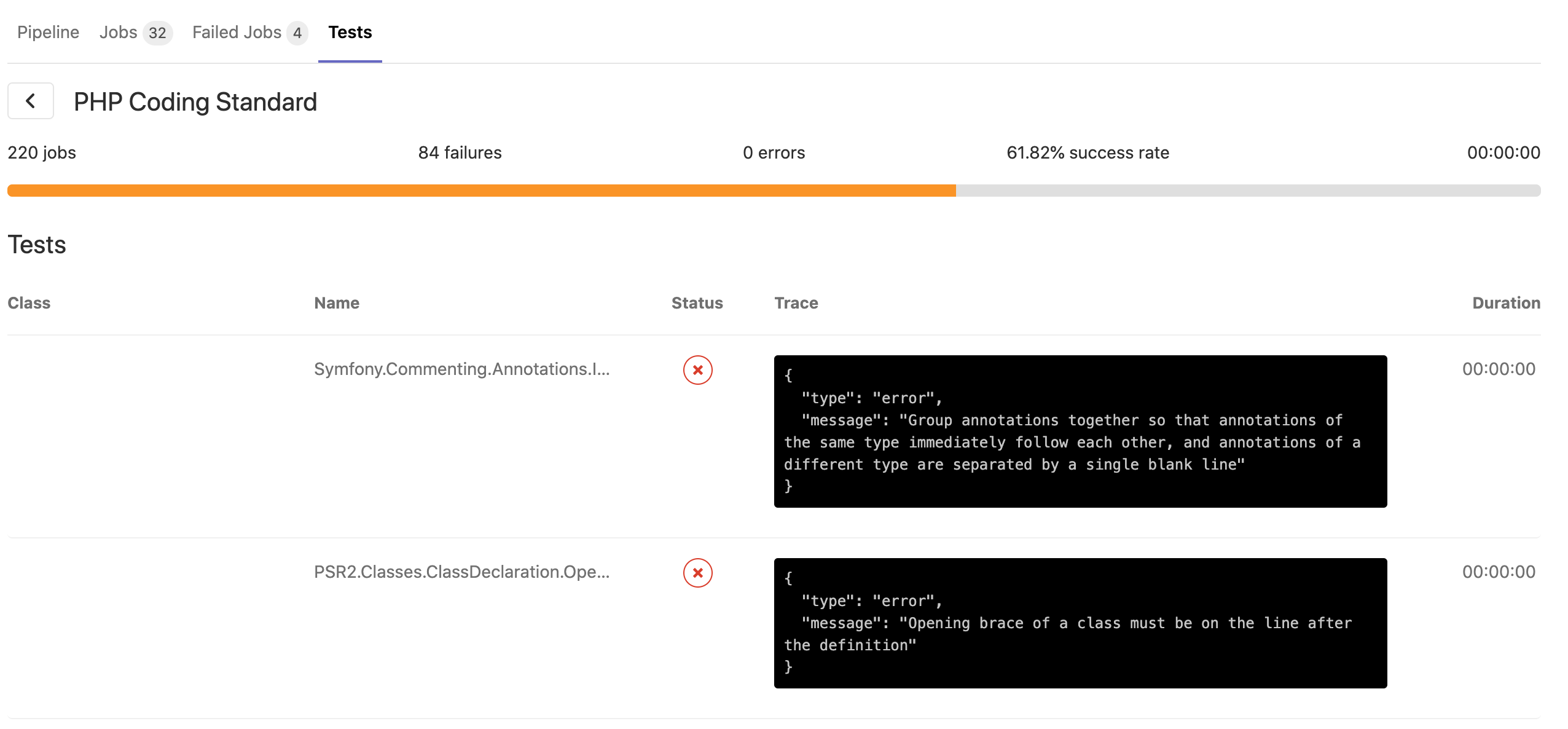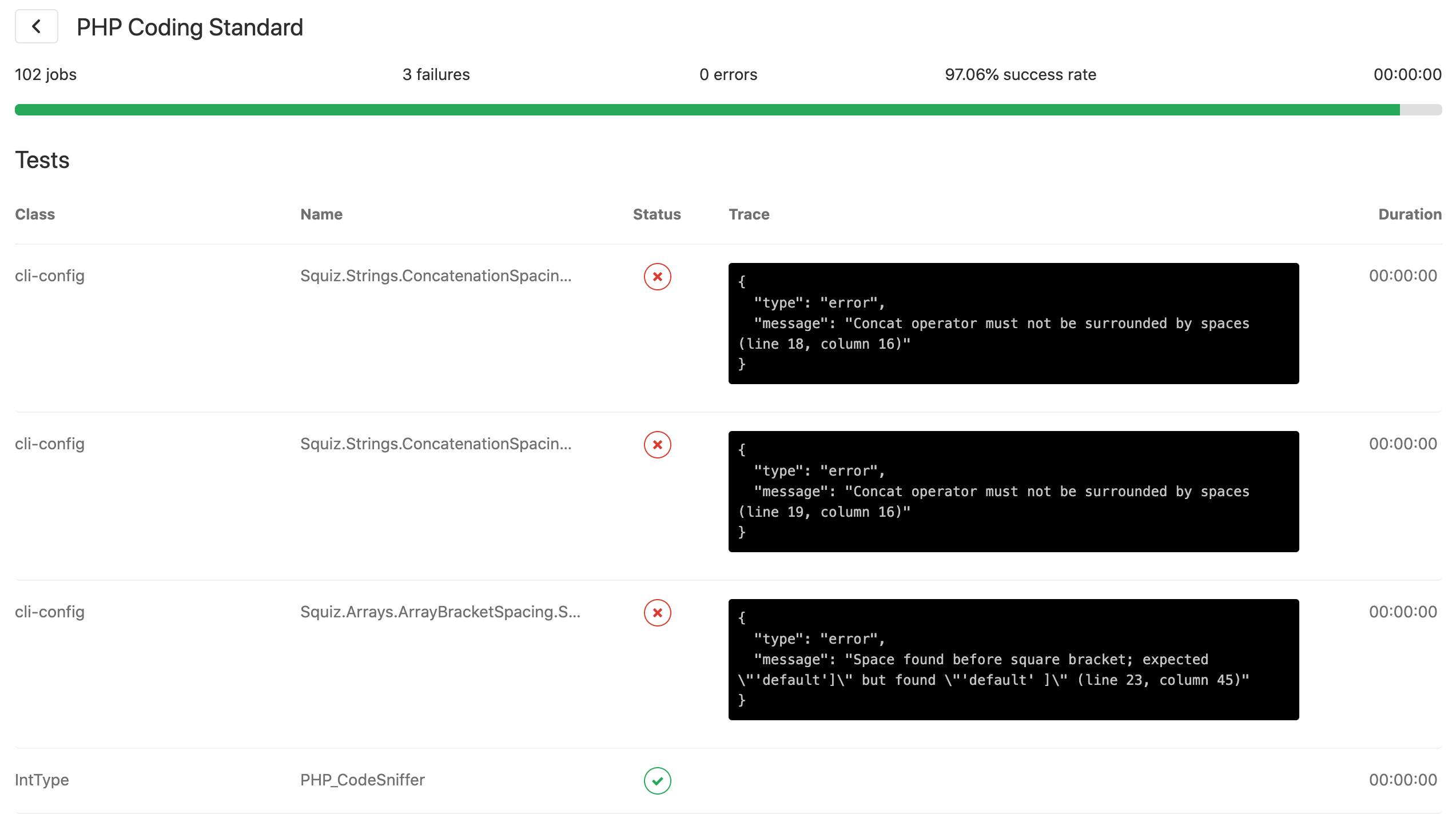Improving Junit-style reporting in PHP CodeSniffer Pipelines
Recently I was shown that in a GitLab-based pipeline I had designed and implemented, the results were presented poorly. Here is an example of how this looked like.
# example output from failing pipeline
Running before_script and script
$ mkdir -p test-reports
$ phpcs --version
PHP_CodeSniffer version 3.5.4 (stable) by Squiz (http://www.squiz.net)
$ phpcs --basepath="$PWD" --parallel=$(nproc --all) --report=junit --report-file=test-reports/php-codesniffer.xml "$PWD"
Time: 21.21 secs; Memory: 7.25MB
Running after_script
Uploading artifacts for failed job
Uploading artifacts...
test-reports/*.xml: found 1 matching files
[...]
ERROR: Job failed: exit code 1
From this output, it was clear that the job failed, but there was no immediate hint why it failed. That’s because we were writing the report as XML to the specified file - and only there. Here’s how the pipeline definition for this step looked like.
# fragment from .gitlab-ci.yml
PHP Coding Standard:
stage: fast checks
image: timetac/ci:php5.6
script:
- mkdir -p test-reports
- phpcs --version
- phpcs
--basepath="$PWD"
--parallel=$(nproc --all)
--report=junit
--report-file=test-reports/php-codesniffer.xml "$PWD"
artifacts:
reports:
junit: test-reports/*.xml
tags:
- docker
- timetac
Improving Display of Details on stdout
After some research I found that phpcs, the tool we’re using to enforce our PHP coding standard is capable of generating multiple reports in one run. I slightly modified the pipeline instructions:
# changes to .gitlab-ci.yml
- --report=junit
- --report-file=test-reports/php-codesniffer.xml "$PWD"
+ --report-full
+ --report-junit=test-reports/php-codesniffer.xml "$PWD"
I instructed phpcs to generate both reports and then made the check fail on purpose to see example output:
# example output from pipeline with adjusted report display
Running before_script and script
$ mkdir -p test-reports
$ phpcs --version
PHP_CodeSniffer version 3.5.4 (stable) by Squiz (http://www.squiz.net)
$ phpcs --basepath="$PWD" --parallel=$(nproc --all) --report-full --report-junit=test-reports/php-codesniffer.xml "$PWD"
FILE: cli-config.php
----------------------------------------------------------------------
FOUND 1 ERROR AFFECTING 1 LINE
----------------------------------------------------------------------
18 | ERROR | [x] Concat operator must not be surrounded by spaces
----------------------------------------------------------------------
PHPCBF CAN FIX THE 1 MARKED SNIFF VIOLATIONS AUTOMATICALLY
----------------------------------------------------------------------
Time: 14.85 secs; Memory: 7MB
While waiting for the results of this run, I made some screenshots how our development team can find the parsed Junit results in GitLab’s web interface. They are surfaced in the Tests tab of a Pipeline (in addition to being displayed directly in Merge Requests if you happen to use GitLab for both Continuous Integration and Development).

Improving Display of Results in GitLab
However, as evident in the screenshot, the results weren’t presented as nicely
as they could be. This sent me quite far down the PHP rabbit hole. After some
research I understood that the collected XML file was missing the classname
attribute. I checked the issue link to see that GitLab instead of customizing
their parsing fixed the issue upstream instead, which is commendable.
References:
- GitLab docs, section: CI/CD, topic: Junit test reports, note “limitations”
- GitLab issue from gitlab-org/gitlab-foss, topic: Support JUnit test report which does not have
classname(eslint/sasslint) - Pull Request to eslint/eslint, topic: Add classname attribute to JUnit testcase
- Junit-Schema on GitHub (contains detailed description of Junit XML format)
Well, let’s also do that. On the other hand, who knows how long it takes for a PR to be accepted and merged? Perhaps a custom report is an option while I wait for upstream to accept possible contributions.
I pinged one of the developers of phpcs via Twitter and got a reply from a
project contributor, that yes, it is possible to generate a custom report. This
was not evident in its documentation. To use a custom report type,
you need to ask for a relative path, an absolute path or a Fully Qualified
Function (FQN) in the --report parameter.
Example:
# call to phpcs requesting a custom report type
phpcs \
--basepath="$PWD" \
--parallel=$(nproc --all) \
--report="$HOME/Repositories/PHP_CodeSniffer/src/Reports/Junit.php" \
--report-file=testreport.xml \
"$PWD"
It is also possible to request this inside the .phpcs.xml configuration for
your project.
<!-- fragment requesting a custom report of type "WPQA" -->
<arg name="report" value="WPQA"/>
References:
- Issue at squizlabs/PHP_CodeSniffer, topic: Allow requesting a custom report using the report FQN
- Pull Request to squizlabs/PHP_Codesniffer, topic: Allow requesting a custom report using the report name or FQN
- Pull Request to squizlabs/PHP_CodeSniffer, topic: SonarQube report format
- Pull Request to squizlabs/PHP_CodeSniffer, topic: Add GitHub Actions annotations report
- Custom phpcs ruleset from jrfnl/QA-WP-Projects
The next step in my adventure was to investigate how the Junit report was generated at the moment and hoping it can be understood easily. Simple enough, I found Junit.php which looked straightforward on the first glance.
On a more closer inspection I found some things I was dumbfounded by.
Making indention consistent
The first thing that struck me as odd was that in generateFileReport() the
XML is produced by building it step by step via XMLWriter and its methods
while in generate() the beginning of the document is written out via echo
calls that contain the actual XML-formatted string. I initially investigated
this because I was wondering why the final XML report uses correct indentation
for the first elements and then seems off for the bulk of the file.
// original snippet generating report.xml
<?php // This opening tag is only for syntax highlighting with pygments
echo '<?xml version="1.0" encoding="UTF-8"?>'.PHP_EOL;
echo '<testsuites name="PHP_CodeSniffer '.Config::VERSION.'" errors="0" tests="'.$tests.'" failures="'.$failures.'">'.PHP_EOL;
echo $cachedData;
echo '</testsuites>'.PHP_EOL;
<!-- inconsistently indented fragment of report.xml -->
<?xml version="1.0" encoding="UTF-8"?>
<testsuites name="PHP_CodeSniffer 3.5.4" errors="0" tests="104" failures="1">
<testsuite name="tests/unit/MiscUtilTest.php" errors="0" tests="1" failures="0">
<testcase name="tests/unit/MiscUtilTest.php"/>
</testsuite>
In trying to make this uniformly written using calls intended for writing XML, I
learned that between XMLWriter, SimpleXML, XMLReader and DOM, it can
be tricky to find the correct solution for your problem. In my specific case,
the only solution that worked for accepting and later properly formatting
partial, invalid XML fragments was DOM. However, this attempt at making
the final result prettier comes with downsides in readability.
// new snippet generating report.xml
<?php // This opening tag is only for syntax highlighting with pygments
$dom = new \DOMDocument();
$dom->formatOutput = true;
$dom->encoding = "UTF-8";
$dom->preserveWhiteSpace = false;
$testsuites = $dom->createElement("testsuites");
$testsuites->setAttribute("name", 'PHP_CodeSniffer '.Config::VERSION);
$testsuites->setAttribute("errors", 0);
$testsuites->setAttribute("tests", $tests);
$testsuites->setAttribute("failures", $failures);
$fragment = $dom->createDocumentFragment();
/*
* Using XML that is partially formatted in appendXML() results in
* dom->formatOutput ignoring the fragment during formatting.
*/
$fragment->appendXML($cachedData);
$testsuites->appendChild($fragment);
$dom->appendChild($testsuites);
// Saving and loading the string forces pretty formatting.
$tmp = $dom->saveXML();
$dom->loadXML($tmp);
echo $dom->saveXML();
<!-- consistently indented fragment of report.xml -->
<?xml version="1.0" encoding="UTF-8"?>
<testsuites name="PHP_CodeSniffer 3.5.4" errors="0" tests="104" failures="1">
<testsuite name="tests/unit/MiscUtilTest.php" errors="0" tests="1" failures="0">
<testcase name="tests/unit/MiscUtilTest.php"/>
</testsuite>
The upside of this approach was that I was able to keep generateFileReport()
exactly as it is. Since I could not figure out what the point to having partial
results as a string that differs for every report type is, I was happy to not
have to change this function. A nice side effect of consistent indention is
code folding working with more editors.
Implementing missing attributes
The second issue I was facing is that for GitLab to display the test results properly, several attributes were missing and some were formatted in a way that were less useful than they could be. Since GitLab are typically quite thorough at requiring tests for how their software should behave, it was helpful to look at the rspec for this behavior to find which XML attributes are supported.
References:
- GitLab’s rspec for Junit report parsing (has exact details against which tests are run)
- GitLab’s fixture for testing Junit reporting (has example values)
# snippet from GitLab's Junit rspec
expect(test_case.classname).to eq('Calculator')
expect(test_case.name).to eq('sumTest1')
expect(test_case.execution_time).to eq(0.01)
expect(test_case.status).to eq(status)
expect(test_case.system_output).to eq(output)
Given the above list, classname was missing. When checking the Junit fixtures
found in GitLab’s code, it seemed file was also missing. I went to verify this
theory by breaking some files in the scanned code base on purpose.
# call to phpcs after putting coding standard violations into 2 files
phpcs --basepath="$PWD" --parallel=$(nproc --all) --report-full "$PWD"
FILE: tests/unit/DeploymentCommandsTest.php
------------------------------------------------------------------------------
FOUND 2 ERRORS AFFECTING 1 LINE
------------------------------------------------------------------------------
44 | ERROR | [x] Space after opening parenthesis of function call prohibited
44 | ERROR | [x] Space after opening parenthesis of function call prohibited
------------------------------------------------------------------------------
PHPCBF CAN FIX THE 2 MARKED SNIFF VIOLATIONS AUTOMATICALLY
------------------------------------------------------------------------------
FILE: cli-config.php
------------------------------------------------------------------------------
FOUND 3 ERRORS AFFECTING 3 LINES
------------------------------------------------------------------------------
18 | ERROR | [x] Concat operator must not be surrounded by spaces
19 | ERROR | [x] Concat operator must not be surrounded by spaces
77 | ERROR | [x] Space after opening parenthesis of function call prohibited
------------------------------------------------------------------------------
PHPCBF CAN FIX THE 3 MARKED SNIFF VIOLATIONS AUTOMATICALLY
------------------------------------------------------------------------------
The generated report.xml was missing the attributes that could make our lives
easier.
<!-- fragment of report.xml after inserting coding standard violations -->
<?xml version="1.0" encoding="UTF-8"?>
<testsuites name="PHP_CodeSniffer 3.5.4" errors="0" tests="107" failures="5">
<!-- ... -->
<testsuite name="tests/unit/DeploymentCommandsTest.php" errors="0" tests="2" failures="2">
<testcase name="PSR2.Methods.FunctionCallSignature.SpaceAfterOpenBracket at tests/unit/DeploymentCommandsTest.php (44:35)">
<failure type="error" message="Space after opening parenthesis of function call prohibited"/>
</testcase>
<testcase name="PEAR.Functions.FunctionCallSignature.SpaceAfterOpenBracket at tests/unit/DeploymentCommandsTest.php (44:35)">
<failure type="error" message="Space after opening parenthesis of function call prohibited"/>
</testcase>
<!-- ... -->
<testsuite name="cli-config.php" errors="0" tests="3" failures="3">
<testcase name="Squiz.Strings.ConcatenationSpacing.PaddingFound at cli-config.php (18:17)">
<failure type="error" message="Concat operator must not be surrounded by spaces"/>
</testcase>
<testcase name="Squiz.Strings.ConcatenationSpacing.PaddingFound at cli-config.php (19:16)">
<failure type="error" message="Concat operator must not be surrounded by spaces"/>
</testcase>
<testcase name="PSR2.Methods.FunctionCallSignature.SpaceAfterOpenBracket at cli-config.php (77:50)">
<failure type="error" message="Space after opening parenthesis of function call prohibited"/>
</testcase>
</testsuite>
As expected, there was neither file nor classname. Furthermore, the line and
column indicator should likely be moved to message in failure for easier
remediation. Taking the first failure as an example, it should probably look
like this:
<testcase name="PSR2.Methods.FunctionCallSignature.SpaceAfterOpenBracket" classname="DeployCommandsTest" file="tests/unit/DeploymentCommandsTest.php">
<failure type="error" message="Space after opening parenthesis of function call prohibited (line 44, column 35)"/>
</testcase>
The next block is what the final XML structure looks like, after some iterations. I
wanted to completely remove the line:column part from name but realized
that some consumers of the report might not be able to cope well with testcase
elements that have both the same classname and name. I used the
Pull Request to eslint as template for how to implement the
additional attributes.
<testcase classname="DeploymentCommandsTest" file="tests/unit/DeploymentCommandsTest.php" name="PSR2.Methods.FunctionCallSignature.SpaceAfterOpenBracket (44:35)">
<failure type="error" message="Space after opening parenthesis of function call prohibited (line 44, column 35)"/>
</testcase>
Here’s what the difference looks like when viewed in GitLab.

Given that, I have adjusted Junit.php and sent a
Pull Request to phpcs.
Make it work right now
While I wait for this part to be merged, I’ve manually patched it into the phpcs installation we use during testing by overwriting the file.
# fragment of .gitlab-ci.yml
script:
# manually copy custom report. It's not possible to print a custom report to a file
# AND a builtin one to stdout in the same run.
# remove after https://github.com/squizlabs/PHP_CodeSniffer/pull/2964 is released
- cp resources/scripts/ci/Junit.php /opt/vendor/squizlabs/php_codesniffer/src/Reports/Junit.php
- phpcs --version
- phpcs
--basepath="$PWD"
--parallel=$(nproc --all)
--report-full
--report-junit=test-reports/php-codesniffer.xml "$PWD"
Dismantling a Leviathan is a series about improving tests and automated quality tools on a large existing codebase.
Improving Junit-style reporting in PHP CodeSniffer Pipelines is part 1 of Dismantling a Leviathan: